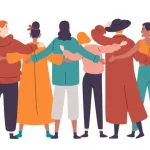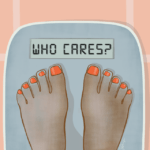Lately, I have noticed everyone around me is constantly anxious or incredibly stressed out. Some are anxious about weight-gain, others are anxious about committing to a period of rest, but nonetheless, we are all constantly so anxious. And while some degree of anxiety is healthy, I feel that living in a constant state of panic is slowly killing us. But I do think it is possible to find a way out of this.
However, before we can combat anxiety, we first have to understand what it is. According to the American Psychological Association, anxiety is an emotion that is characterized by tense feelings, worried, ruminating thoughts, and physical responses. And, lucky for us, I say sarcastically, anxiety comes in all different forms, from social anxiety to separation anxiety and everything in between. It inspires feelings of restlessness and fear, as well as physical sensations, such as shallow breathing or a racing heart. But to put things in simplest terms, anxiety is our body hitting the panic button in a response to a perceived threat.
I am sure you realize that the word perceived is bolded, and there is a reason for that. Yes, anxiety is a function of safety. It is designed to keep us out of harms way. Unfortunately, harm is not what it once was (entirely). For instance, in cavemen era, we had to stay alert and on edge, otherwise we were killed by lions, and we did not have the cognitive capability to decipher whether there was a predator or if it was the wind. And while death by lions is no longer a realistic threat, our brains seem to still interpret that any kind of threat holds this degree of severity.
This is where it is important that we understand how “perceived” comes into play. We have evolved and are able to recognize what is a deathly threat and what we may be overanalyzing. And yes, this all sounds reasonable in theory, but to practice it is much harder.
Now, as I mentioned before, a lot of people, myself included, feel anxiety around things like weight gain, periods of rest, not settling down by a certain age, and so on. Even though these things will most likely not kill us, not meeting them insinuates that we will be rejected by the ingroup, or society. Bringing it back to the caveman days, if we were rejected from our community, we did not survive. Today, we have correlated a lack of success by any means to rejection from society. That is scary.
I know, all of this is a lot to take in, and a lot to live with. However, we have evolved and are capable of leading an enjoyable life despite periods of anxiety. We can break free from these continuous states of panic. And before I share three tips on how you can, remember: you are not broken if this is your experience, and you are worthy of healing.
Tip #1: Determine if you are actually in an unsafe or dangerous situation. Ask yourself this, “Is this an actual threat to my safety?” Obviously, if the answer is yes, act accordingly. However, I am sure that, more often than not, the answer is no. If the answer is no, speak directly to your anxiety, “I see that you are trying to protect me, and I appreciate that. In this moment, it actually isn’t serving me, though. I am not unsafe, just uncomfortable.”
Tip #2: Once you have determined if the situation is unsafe or not, weigh the pros and cons. Let’s say you are anxious about taking a week off of work. The cons are you may fall behind on some work or maybe your boss becomes angry. The pros are you will have time to finally prioritize your mental health and increase your overall productivity. In this situation, it seems that the pros outweigh the cons. Not to mention, that the cons are manageable and will be better addressed if you take a week of rest, rather than not take one.
Tip #3: Expect to be uncomfortable. Just because you chose to move forward with something does not mean that your anxiety will automatically subside. In fact, it may get louder. That’s okay because if you know this, you can prepare for it. Have a toolbox on hand of techniques you can use to calm your body and mind, such as box-breathing, going outside, or exercising.
And always remember, you can do hard things. I am rooting for you.
Resources:
American Psychological Association. (2021). Anxiety. American Psychological Association. Retrieved October 10, 2021, from https://www.apa.org/topics/anxiety.
Mayo Clinic. (2018, May 4). Anxiety disorders. Mayo Clinic. Retrieved October 10, 2021, from https://www.mayoclinic.org/diseases-conditions/anxiety/symptoms-causes/syc-20350961.


